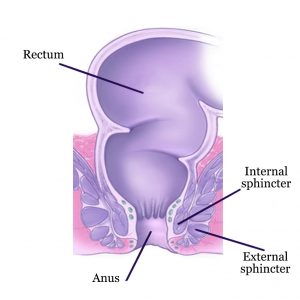What is anal pain?
The anus is the last portion of the large bowel [Figure 1]. It is a short tube surrounded by the sphincter muscles (internal and external) which provide control of bowel motion. Anal pain is very common and can be deep (felt as high as the junction of the anus with the rectum) or more superficial at the skin level. It can occur before, during, or after bowel movement. The pain can be mild or very severe. Other associated symptoms can include bleeding, itching, drainage, or the feeling of a lump.

Figure 1 – The anus with surrounding internal and external sphincter muscles
What causes anal pain?
While most patients and physicians attribute anal pain to hemorrhoids, it is important to note that many other proctologic conditions can present with anal pain. Causes of anal pain include:
- Anal Abscess and Anal Fistula. These 2 conditions are related and caused by an infected anal gland or in some cases inflammatory bowel disease, childbirth, radiation, or atypical infections. In addition to pain, redness, swelling, or drainage can be present
- Anal Cancer. Although uncommon, anal cancer is on the rise and can present with anal pain, a non-healing ulcer or a lump
- Anal Fissure. A cut in the anus can present with severe anal pain, especially with or after defecation. It can be associated with anal bleeding
- Hemorrhoids. Two types of hemorrhoids exist: internal and external. In general, internal hemorrhoids can bleed or protrude but severe cases of strangulated internal hemorrhoids (non-reducible and swollen) can present with severe pain. However, when hemorrhoids hurt, they are often related to a thrombosed (clotted) external hemorrhoid under the anal skin
- Sexually transmitted diseases. Pain with anal ulcerations related to sexually transmitted diseases can present with severe pain. Herpes virus infection can cause severe anal pain. Other types of sexually transmitted diseases such as gonorrhea or chlamydia can present with pain, drainage, stool urgency, and/or bleeding
It is important to note that other conditions such as levator syndrome (spasm of the pelvic floor musculature), rectal cancer, rare anal or pelvic tumors, atypical infections such as tuberculosis, and anal trauma can present with anal pain.
When should you seek help?
Anal pain is common and can be mild and self-limited. However, pain that is severe and does not go away within 24 to 48 hours should be evaluated. Furthermore, patients with pain that is associated with bleeding, drainage, fever, or feeling of a lump should seek care. Pain that is mild but does not go away within a week should prompt an evaluation. It is important for patients not to self-diagnose and to visit a proctologist for further evaluation. Delays in diagnosis and initiation of the proper treatment can lead to worsening of the situation and unnecessary suffering.
How is anal pain evaluated?
The history and physical examination are important in reaching a diagnosis. An office-based examination includes visual inspection of the skin, finger palpation of the anus, and Anoscopy or Proctoscopy to look inside the anus and rectum. Although a diagnosis can be formulated in the office for most patients, occasionally additional imaging tests such as an endoanal ultrasound, CT scan (computed tomography) or MRI (magnetic resonance imaging) may be required. Additional blood work and/or swab cultures are advisable in cases of suspected infections or sexually transmitted disease. Colonoscopy may be required in patients with associated abdominal symptoms or findings suspicious for inflammatory bowel disease. A small group of patients with severe anal pain with an incomplete examination in the office or with findings suspicious for a deeper infection may require an examination under anesthesia in the operating room
How is anal pain treated?
Effective treatment of anal pain requires establishing the correct diagnosis. Treatment can vary from the use of prescribed medications, to office-based procedures, to surgical interventions in the operating room. Dr. Maher Abbas will assess your pain, determine your diagnosis, and describe to you the proposed treatment.
Why is it important to seek expert care with a board certified proctologist and colorectal surgeon?
Anal pain requires a good evaluation of the anus and should be done by doctors who have the expertise treating this condition. Proper diagnosis and treatment are critical to obtain relief from the pain.

Dr. Maher Abbas is an expert in the treatment of diseases of the colon, rectum and anus. With over a 30-year career in the USA, he has completed advanced surgical training and is American Board Certified in Colon and Rectal Surgery. Dr. Maher Abbas is a Fellow of the American Society of Colon and Rectal Surgeons.
If you would like to schedule a consultation with Dr. Maher Abbas to discuss your case, click here.



